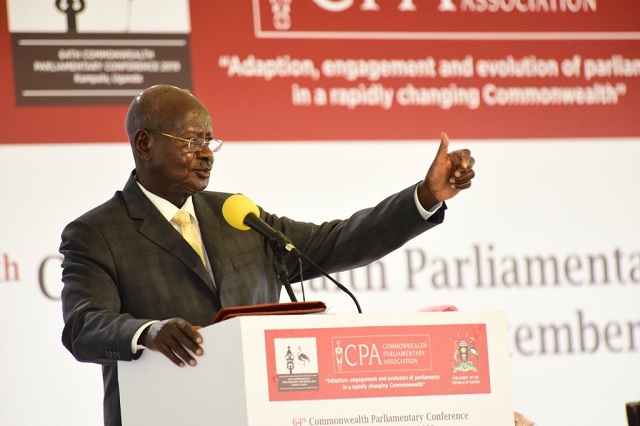
Kampala, Uganda | THE INDEPENDENT | President Yoweri Museveni has tasked Commonwealth countries to use their numbers to promote investments, work together on security and cultural exchanges.
The President was on Thursday officiating at the opening ceremony of the 64th Commonwealth Parliamentary Conference (CPC) at Speke Resort, Munyonyo.
The conference attended by delegates from different countries including Canada, Australia, United Kingdom (UK), Kenya, Zambia, Malawi, India and others is under the theme “Adaption, Engagement and Evolution of Parliaments in a rapidly changing Commonwealth.”
Museveni, the Vice Patron of Commonwealth Parliamentary Association (CPA) said that the Commonwealth Countries could use their numbers of 2.5 billion people to mutually promote investment and achieve a lot more without disturbing the Continental Free Trade Area- CFTA arrangements in Africa.
“In my view, the commonwealth countries, in substance, are democratic countries, albeit with variations in form; and this is a great achievement,” said Museveni.
He also said that the Commonwealth countries can peacefully work with all countries of the world irrespective of their internal social-systems for mutual advantage and on the basis of respecting the sovereignty of each country.
“It is wiser for the World leaders to respect the internal systems of each country and influence others by example. It says in the Book of Mathew: Chapter 5 verses 15-16: “Let your light so shine before men, that they see your good deeds and praise your Father in heaven”. If our practices are correct, they will thrive and spread. If they are wrong, they will collapse. It is not necessary to generate crisis on account of differences in ideology. Let there be peaceful competition among different ideas. The right one will emerge,” he said.
He emphasized the need not to create crises in attempts to coerce people that have different ideas to be like countries in the Commonwealth.
Museveni further tasked delegates to promote the spread of the benefits of scientific innovation saying that in all ages, the advances in science and technology have always been the primers of change in society for good or for evil but that this time, insisting that those advances are only for good and never for evil.
“Fifthly, the protection of the environment must remain, not only a core point of our commitment but also a basis of our agreed point of action. The oppression of man by nature can be solved by the use of science throughout the whole world. The oppression of man by man is always better resolved by the affected communities, in some extreme situations supported by appropriate external solidarity. This is what we did with apartheid and colonialism,” said Museveni.
Meanwhile, Speaker of Parliament Rebecca Kadaga who doubles as the Commonwealth Parliamentary Association (CPA) president-designate said that a lot was changing in Commonwealth nations, from the demographic characteristics to the diversities of race, belief and people’s needs.
She said that there is a growing focus on greater scrutiny of Parliamentarians, coupled with a demand for accountability and transparency and that the public trust in Parliaments is flagging in most countries, yet the people increasingly expect more from their representatives.
“In truth, it is not only the Commonwealth that is rapidly changing; one just has to read or watch the news to see that the rest of the world is experiencing the same growing pains. With globalization trends, International borders increasingly seem like mere demarcations, and the challenges we face cut across boundaries. We are faced by threats that do not know the colour of our skins, our creeds, our poverty, wealth, or political affiliations,” said Kadaga.
The Speaker said that the major issues parliamentarians are forced to confront are climate change, individual and group terrorism, hunger and malnutrition, old and new disease epidemics; local and regional conflicts; and the rising frequency and cost of natural and man-made disasters.
She said that these threaten the present and future well being of Commonwealth citizens and that parliament should not also forget the ever-growing numbers of refugees, distressed persons, and stateless persons in the Commonwealth countries.
******
URN
 The Independent Uganda: You get the Truth we Pay the Price
The Independent Uganda: You get the Truth we Pay the Price



